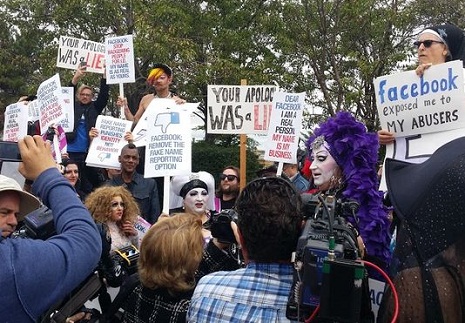About 100 people turned out for the protest, according to Lil Miss Hot Mess, a drag queen from San Francisco.
Lil Miss Hot Mess, who declined to provide her legal name, said she and others are trying to draw attention to how Facebook users target and bully others by reporting others for using fake names on the social network.
The reporting process for "fake names" is rife with abuse, she said.
Lil Miss Hot Mess and others who had had their Facebook accounts shut down formed the #MyNameIs campaign last fall. The campaign, which has led to some concessions by Facebook, includes women who are survivors of domestic violence and Native Americans who used tribal names different than those on their driver`s licenses.
"One of the great things is that I think we really showed the diversity of people affected by this issue today," Lil Miss Hot Mess said.
Facebook spokesman Andrew Souvall declined to comment on the protest.
Facebook has a longstanding policy requiring users to register with a "real identity" that matches government-issued identification, student IDs or credit cards. The company says it does not actively seek out people violating the policy but investigates after other Facebook users flag accounts.
In a blog post on Monday, Facebook`s vice president of global operations, Justin Osofsky, and its head of global product policy, Monika Bickert, said the company is "committed" to its authentic name policy to "protect our community from dangerous interactions."
"When people use their authentic names on Facebook they are more accountable for what they say. People can be assured that they`re really connecting with their loved ones, and no-one can hide behind an anonymous name to bully, taunt or say insensitive or inappropriate things," they wrote.
Facebook has loosened its requirement that people use their legal names after protests in the fall. The company says it has also taken steps to make it easier for people to confirm their identity, the company says.
Users in the U.S. can now have access to their account during a seven-day grace period before it is shut down. Facebook has expanded the documents that people can use to verify their authentic name, including a magazine subscription, utility bill or library card.
"The changes they have made are meaningful but they are small," said Lil Miss Hot Mess whose account was shut down for two weeks after users reported she was not using her real name.
Transgender youth frequently don`t have pieces of identification for their chosen names instead of their birth names. A survivor of domestic violence may use a nickname known to friends and family but not to an abuser, Lil Miss Hot Mess said.
"We have tried to suggest to Facebook that they find a way to authenticate a real human being without relying on verifying that person`s name," she said.
Facebook`s concept of real identity was a breakthrough when the social network launched in 2004, a departure from the rampant use of aliases and pseudonyms.
Facebook product chief Chris Cox in October publicly apologized for how Facebook`s real name policy had affected people.
"We owe you a better service and a better experience using Facebook, and we`re going to fix the way this policy gets handled so everyone affected here can go back to using Facebook as you were," Cox wrote in a Facebook message.
"For Sister Roma, that`s Sister Roma. For Lil Miss Hot Mess, that`s Lil Miss Hot Mess," Cox said.
The protest over Facebook`s "real name" policy is part of a broader struggle in digital culture to control online identity and privacy, she said.
"We think Facebook is on the wrong side of this issue," Lil Miss Hot Mess said.
In 2011, activists including Skud, Eva Galperin, Jillian C. York, and others launched the website MyNameIsMe.org to call for social networks like Facebook and Google+ to allow "users to identify themselves by whatever name they choose, providing that the name they choose is not, in and of itself, abusive." The site includes resources and personal stories about the importance of online anonymity for many marginalized groups.
More about:
















































